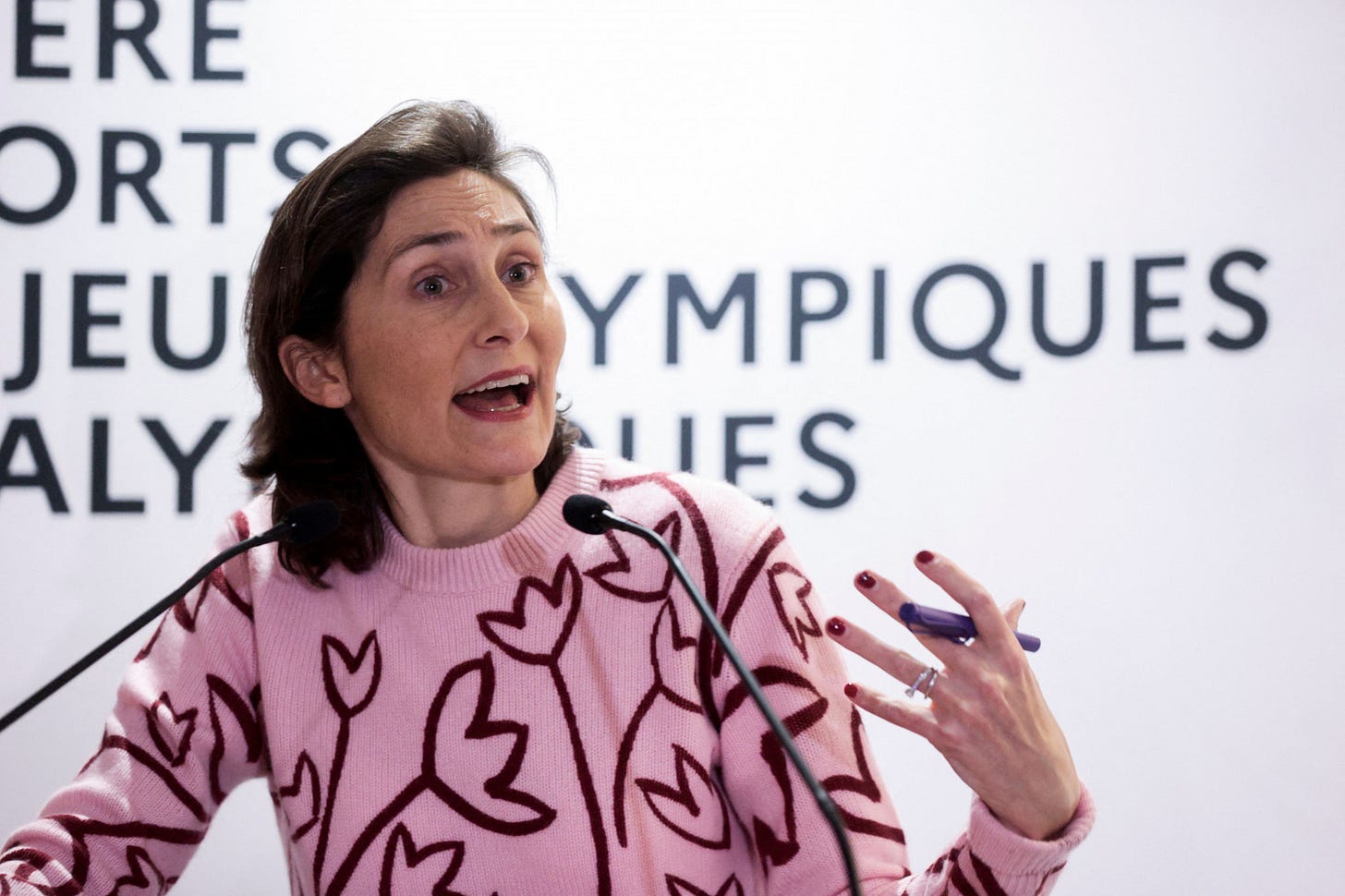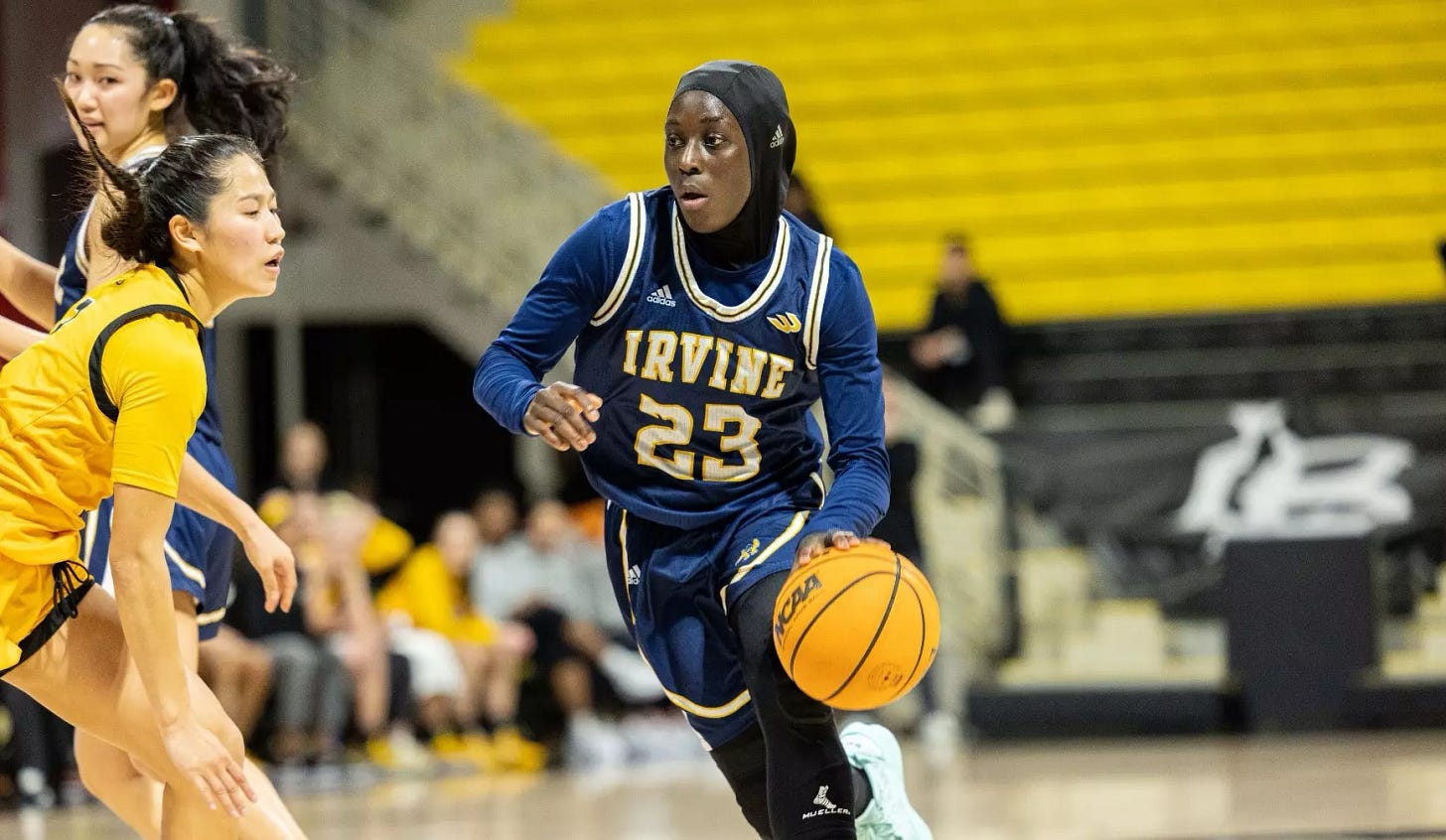Paris Olympics doesn't align with the foundation of sports.
Hijab bans on French athletes goes against what women's sports preaches, ultimately set to leave a stain on the Paris Olympics.
282 French women across 35 different sports will be representing their nation at this year’s Summer Olympics in Paris. All of them originate from diverse backgrounds, carry a unique story to becoming Olympians, and act as role models for those who dream of being the same. After all, “If you can see it, you can be it.” However, that is not the case for French women who wear the hijab (an Islamic headscarf).
In September of 2023, the International Olympic Committee ruled that participants in the Paris Olympics are free to wear the hijab during competition and in the village. Yet, this ruling does not stop federations from imposing their own participation rules.
Nevertheless, a few days later, French Sports Minister Amelie Oudea-Castera announced the country’s hijab ban on Muslim French athletes for the Olympics, in respect to principles of secularism. None of the athletes from visiting nations have to abide by the ruling as their federation does not have such regulation.
This is not exclusive to just the Olympics. The deceleration is imposed in several sports in France, including football, basketball, and volleyball, in competitions at all levels, including youth and amateur ones. It further extends to coaches, support staff, and officials.
Unsurprisingly, the ban flies in the face of the human rights requirements for host countries and the IOC Strategic Framework on Human Rights - “explicit prohibition of discrimination” - as well as being antithetical to the Fundamental Principles of Olympism which include, excellence, respect and friendship. Additionally, there is a clear violation of the Olympic Charter which states:
"The enjoyment of the rights and freedoms set forth in this Olympic Charter shall be secured without discrimination of any kind, such as race, colour, sex, sexual orientation, language, religion, political or other opinion, national or social origin, property, birth or other status."
So, what has the IOC said about this? Highlighted in a recent Amnesty International report, the IOC states, “France’s prohibition on sports hijabs was outside the remit of the Olympic movement,” claiming that “freedom of religion is interpreted in many different ways by different states.”
It is difficult to categorize this as a strong response as it completely fails to challenge France, and attempts to deflect authority. In fact, just last month, the IOC’s Executive Board recommended awarding the 2030 Winter Olympic and Paralympic Games to France.
CBC Senior contributor and award-winning journalist, Shireen Ahmed described France’s ban perfectly, “Forcing women outside of clothing is as violent as forcing them into it.”
In a time when women’s sports are bigger than ever, the exclusion of hijabi women participating at any level limits and hinders possible growth. Last year’s FIFA Women’s World Cup broke viewership, revenue, and attendance records, providing a glimpse into the future of the women’s game on both national and international levels.
This year’s Paris Olympics is expected to follow with more breaking records, but French women wearing a hijab are not allowed to be part of history.
Last summer in Australia and New Zealand, Moroccan defender Nouhaila Benzina was celebrated for being the first woman in hijab to play football at the highest level of women's sport. If Benzina lived in France, she would not be able to play for any club there, and if she was French, she would not be able to play for country.
“My message to hijabis is to stick to their dreams. It has nothing to do with sport, it is a personal choice.” Benzina told FIFA during the World Cup.
Recent reports highlight the connection between the visibility of female athletes and the increase in girls’ participation numbers across sports, especially football. The kids see it, they want to become it. What about young Muslim girls in France?
Such discriminatory rules push women out of sports and discourage them from playing. Lina Boussaha is a midfielder and PSG academy graduate who represented France across four youth stages from 2015 to 2023.
In 2022, she decided to wear the hijab, which meant giving up professional football in her hometown and the country for which she had proudly worn the jersey. Today, she plays for Al Nassar FC in Saudi Arabia and represents Algeria on the international stage, a position granted through her parental descent.
Similarly, Diaba Konaté is a basketball player at the University of California, Irvine, who cannot represent France because she wears a hijab. Like Boussaha, she grew up in Paris and was forced to leave the country in pursuit of her passion. Even if Konaté were breaking NCAA records as Caitlin Clark did, she still wouldn’t be able to wear a France jersey - she simply isn’t welcome.
Women’s sports have been built, led by, and fought for, by athletes of all backgrounds who have instilled inclusivity, diversity, and inclusion as fundamental values of the sport.
Canada’s non-binary midfielder Quinn, the women of colour on the USWNT, and Morocco’s Benzina are living proof of that. Women’s football is inclusive, but it is a quota none of the French sporting federations fulfill. It has been the bigoted, racist, and homophobic individuals like Oudea-Castera in this case, that have allowed discrimination to persist.
In another instance, Tina Rahimi will be the first female Muslim boxer to represent Australia at the Olympic Games this summer. However, if she were French, her hijab would prevent her from competing in Paris. In a recent TikTok on her personal account, Rahimi opened up about France and the hijab ban. She questions, “How is my hijab going to affect anything?”
The truth is, wearing a headscarf during a sporting event does not make one a better or worse player, nor does it say anything about their skill level. Just like their teammates or opponents, they are there to compete, not preach about their religion or spread the gospel. French policymakers suggesting the hijab is a threat to sports bite into nothing more than misinformation and Islamophobia.
Despite an Amnesty International report pointing out the violations caused by the hijab ban, public outrage, and incongruence with the Olympic charter, France’s xenophobic system does not care and will continue to persist, casting a dark cloud on women’s sports. This has nothing to do with secularism or Western values, it is bluntly racist.
The Olympic Charter in itself states: “The practice of sport is a human right. Every individual must have access to the practice of sport, without discrimination of any kind in respect of internationally recognised human rights within the remit of the Olympic Movement.”
The 2024 Paris Olympics and Paralympics will likely be remembered as a blemish on gender equality and the principles that women’s sports stand for. By going against the Olympic Charter, the host nation, France, denies some girls and women their guaranteed right to participate in sports. That is shameful, and quite frankly, sad.





